GOT AN IDEA?
PUT IT TO WORK PLUS NRHA Pros Of The Year
Uncover Your Value Proposition
Insure Your Event


GOT AN IDEA?
PUT IT TO WORK PLUS NRHA Pros Of The Year
Uncover Your Value Proposition
Insure Your Event

By
15
By Jennifer Paulson • Meet the pros identified by NRHA Affiliates and chosen by NRHA Professionals as outstanding in their fields. AND
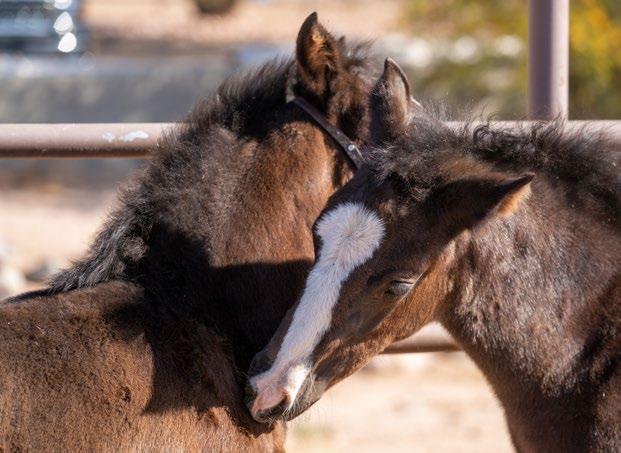
3
7
EDITOR/PUBLISHER
Jennifer Paulson
jenpaulsoncreative@gmail.com
CREATIVE DIRECTOR
Sandy Cochran
NRHA COMMISSIONER
Gary Carpenter
NRHA ASSISTANT COMMISSIONER
Christa Morris-Stone
DIRECTOR OF MARKETING; MANAGER OF YOUTH & AFFILIATE PROGRAMS
Sara Honegger
NRHA PROFESSIONALS COMMITTEE CHAIR
Jordan Larson
SENIOR DIRECTOR OF EDUCATION & JUDGES; NRHA PROFESSIONALS COMMITTEE STAFF LIAISON
Patti Carter
NRHA PROFESSIONALS COMMITTEE MEMBERS
Dan Huss (Vice Chair), Nick Valentine, Hiram Resende Silva Filho, Ryan Rushing, Matt Palmer, Kole Price, Kaci O’Rourke, Tracer Gilson, Casey Hinton, Trevor Dare, Jason Vanlandingham, Gunny Mathison
NRHA
3021 West Reno Ave. Oklahoma City, OK 73107-6125 (405) 946-7400 / nrha.com
For NRHA Pro Trainer submissions or story ideas, email jenpaulsoncreative@gmail.com.
NRHA Pro Trainer is published by NRHA. All rights reserved. Reproduction in whole or in part of any article without prior written permission from NRHA is strictly prohibited. NRHA cannot accept any responsibility for any error or omission which might occur. Receiving this publication does not confirm or imply that your NRHA Professionals membership is current, and NRHA accepts no liability for anyone competing with an expired membership.
NRHA PRESS RELEASE
NRHA held its annual Winter Meeting
February 5–7, 2023, at the Embassy Suites by Hilton in downtown Fort Worth, Texas. The venue was the meeting place for NRHA Board, staff, committee members, and the membership to meet and to review and guide the association’s direction going forward.
During the three days of meetings, the board, executive committee, Reining Horse Foundation Board of Directors, and several advisory committees convened. The annual general membership meeting was also held Tuesday morning and gave members the opportunity to receive an update from NRHA leadership and ask questions.
NRHA President Mark Blake highlighted the success NRHA saw in 2022, including a 14% increase in approved events worldwide, with a record-setting 125,000 total entries. Additionally, the nomination program saw its highest numbers since its inception, topping 3,000 North American weanling nominations for the first time. NRHA membership remains stable, with the non professional category boasting its highest membership rates since 2015. Read more on the 2022 Statistics Overview here.
NRHA Chief Financial Officer John Foy gave an extremely positive, in-depth financial overview of the association, which included an explanation of the new 4-year-old nomination component (read more here), which will begin with 2023 foals, NRHA Futurity purse milestones, and an update on the annual audit that will be posted online for members in the next few weeks. He said the association will
continue to invest in high-performing assets and has the liquidity to navigate, even during economic downturn.
Gary Carpenter, NRHA Commissioner, announced his planned retirement after leading NRHA since 2014. During Carpenter’s time with NRHA, the association has seen massive expansion, boasting the lowest turnover rates and a well-tenured staff, speaking to his incredible leadership. An official search committee has been formed to find his replacement.
Following the annual general membership meeting, the Judges Committee held a review of the top 2022 NRHA Futurity runs with an open dialogue regarding scoring while watching videos of selected runs. Patti Carter, Senior Director of Education & Officials, and the Judges Committee teaching panel talked through the evaluation of the runs, answered questions, and provided clarity on current judging standards.
2023 Affiliate Regional Championship and Adequan® North American Affiliate Championship Conditions. The Board moved to approve keeping the Affiliate Regional Championship (ARC) and Adequan® North American Affiliate Championship (NAAC) qualification the same as the previous year. To compete at an ARC, a rider must be an NRHA member and a member of an NRHA affiliate. Any exhibitor who receives a score higher than a zero at an ARC will be able to enter that class, on that specific horse, at the Adequan® NAAC in Oklahoma City. →
NRHA Professional Linde Von Koeding organized a recent judging clinic in Scottsdale, Arizona, instructed by NRHA Judge’s Committee Member Bob Kail, with all proceeds gifted to the Reining Horse Foundation. Generous upport from the Fairmont Scottsdale Princess resort, the location of the clinic, made the gift larger. It was a great turnout from NRHA members of all ages.
This is the second clinic Von Koeding has hosted with proceeds directed to RHF. She organized a similar effort in 2021 featuring Doug Allen.
2024 NRHA Elections. Submissions for 2024 NRHA Regional Director and NRHA Director-at-Large elections are due in office on June 1. For more information, including open seats and qualifications for running, visit nhra.com/elections.
Rule Change Proposals. The 2023 Rule Change Proposals were reviewed by the Board for the first time. The board will review them again prior to voting, and they will be sent to committees and will soon be available online to the NRHA membership for feedback.
Recommended Judges’ Fee Increase. The Board approved a recommendation from the Judges Committee to recommend that all “AA” events pay their judges a minimum of $750 per day, along with reasonable travel expenses. For all other events, the committee recommended judges’ fees be increased to a minimum of $600 per day, plus reasonable travel expenses. The committee also recommended judges be compensated 10% of their day fee for every hour over 10 hours spent judging (not including breaks).
NRHA-Owned Event Schedules Approved. The 2023 6666 NRHA Derby presented by Markel and the 2023 NRHA Futurity & Adequan® North American Affiliate Championship schedules were approved by the NRHA Board of Directors. The Derby schedule is available at nrhaderby.com, and the Futurity schedule will be available at nrhafuturity.com. A change to note is the approval to switch the Open and Non Pro go-round order at the NRHA Derby to be more accommodating to non pros who make the finals.
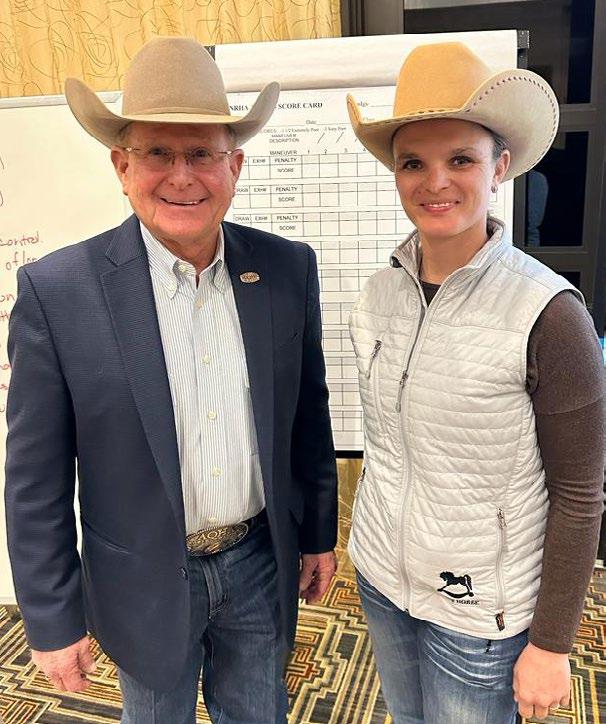
Reining Horse Foundation Board Meeting. The Reining Horse Foundation (RHF) Board of Directors approved significant expansion to two of its flagship programs: the Dale Wilkinson Memorial Crisis Fund and the RHF Scholarship program. Increased donor support in recent years has made it feasible for more dollars to be returned to the reining community, which is the heart of the RHF mission. In November
2022, the board designated up to $250,000 in additional funding support for core programs, with proposals to be brought forward from RHF standing committees. The Crisis Fund grant maximums are being increased substantially, more than double previous funding thresholds. Four RHF Scholarships amounts are being increased immediately, and five new scholarships will be added in 2024. n
Please visit nrha.com and ReinerSuite™ for the most updated information.
April 1
Second NRHA Futurity payment due
May 15
6666 NRHA Derby Presented by Markel entries due
Entries are due in office by this date. They must be received in office by June 1 to be included in the regular draw. Visit nrhaderby.com or email events@nrha .com for more information.
May 23–27
NRHA European Futurity Cremona, Italy
For more information, visit nrhaeuropeanfuturity.com.
June 1
Third NRHA Futurity payment due
June 1
NRHA Hall of Fame nomination deadline
Nominations for the NRHA Hall of Fame Class of 2023 must be postmarked by this date. More details on criteria and forms are available at nrha.com/forms.
Dale Wilkinson Lifetime Achievement Award nomination deadline
Nominations for the 2023 Dale Wilkinson Lifetime Achievement Award must be postmarked by this date. More details on criteria and forms are available at nrha.com/forms.
Affiliate and write-in candidate deadline
Submissions are due for affiliate and write-in nominations for 2024 regional director and director-at-large elections. For more information, visit nrha.com/ elections.
June 13–25
6666 NRHA Derby presented by Markel Oklahoma City, OK
Forms and more information are available at nrhaderby.com. Email questions to events@nrha.com.
July 1
First Sire & Dam Futurity payment due
July 10–15
NRHA European Affiliate Championships
Givrins, Switzerland
For more information, visit nrhaeac.com
August 1
Fourth NRHA Futurity payment due
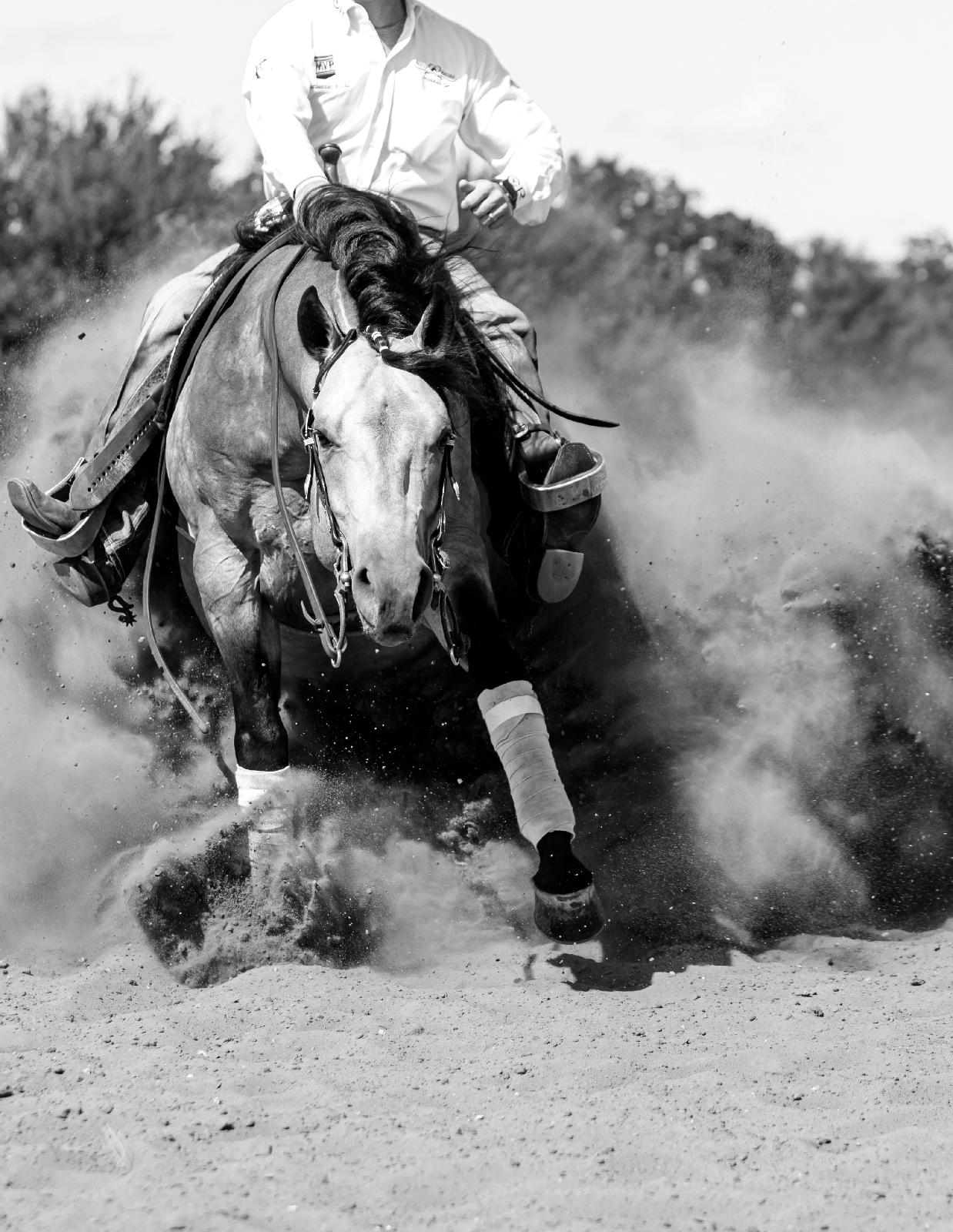
BY ENSURING THAT YOU HAVE THE APPROPRIATE POLICIES IN PLACE, YOU’LL KEEP YOURSELF PROTECTED WHEN HOSTING A CLINIC ON YOUR PROPERTY.
BY KRISTIN PITZERAt some point in your career, you might consider hosting a clinic as a way to meet new prospective clients and give back to the industry by sharing the knowledge you’ve gained as a trainer. Before you start planning the topics you’ll cover, days to schedule it, or even the lunch menu, though, you need to assess what risks you might face.
When you bring people to your facility, whether they’re riders, auditors, or parents who are just there to watch, you could assume
liability for them if you’re not properly covered, warns Jordan Willette, an attorney based in Phoenix and San Francisco. To protect yourself and your name as a trainer, there are a few things you should do before you ever announce your event.
Hosting a clinic at your facility allows new people and horses access to your property. If any
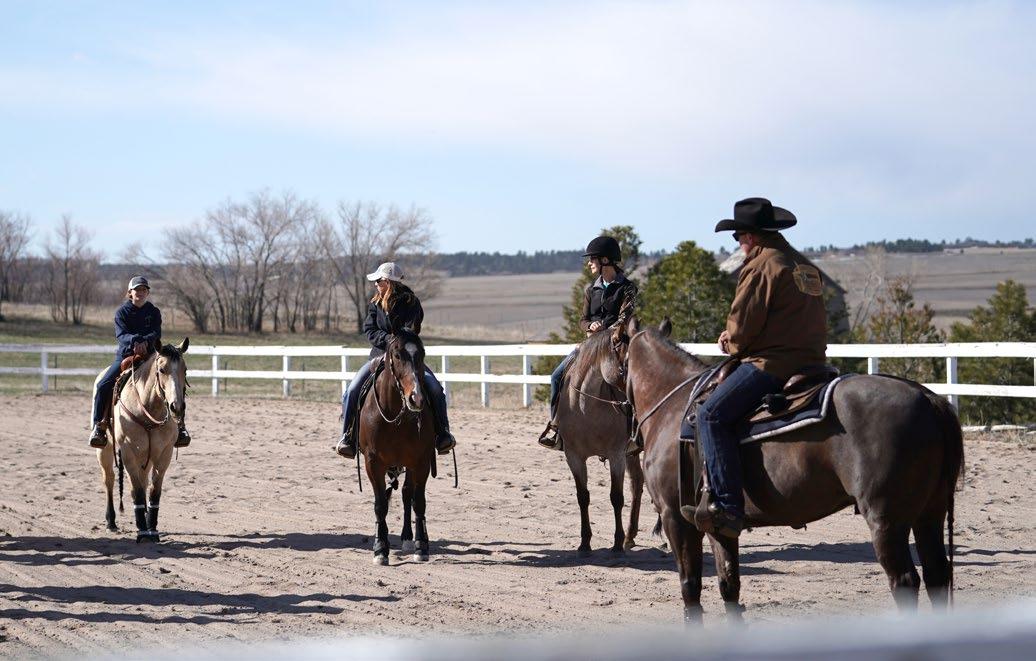

of them gets hurt, you’ll want to ensure that you’re protected from liability, whether that’s by your existing insurance policies or through your state’s equine liability protection act.
Each state has its own requirements for what a horse professional or property owner needs to do to ensure liability protection, but if you’re in California or Maryland, which do not have equine liability protection acts, you’ll absolutely want to check that you have the appropriate insurance policies in place.
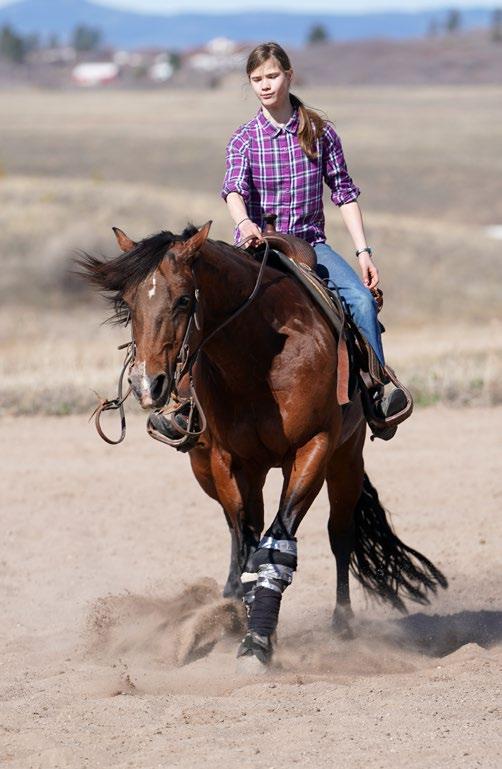
Under some commercial or property owner insurance policies, a clinic may be covered. Always contact your insurance provider and ask beforehand so you’re not blindsided by an exception.
“You can call your insurance provider and say, ‘I’m thinking about hosting a clinic, and this is what we’re anticipating. Would a clinic be covered under my existing policy?’” Willette suggests. “Equine liability protection acts cover most situations if a person or a horse gets hurt, unless it’s a case of gross negligence such as where the property owner or trainer completely ignored blatant security risks, such as a horse being dangerous, a horse being too advanced for a beginner rider, or property management aspects like a giant hole in the arena. There are many situations where the average horse-related accidents are protected against liability under state laws.”
If your existing insurance policy doesn’t cover clinics, you can purchase a short-term insurance rider that covers anything specific to your event. Even with that policy in place, though, you’ll want to take some other measures to fully protect yourself in the event of an accident.
Anybody coming onto your property—riders, auditors, parents, trailer drivers—needs to
sign a liability waiver when they arrive for the clinic. Liability waivers aren’t always required depending on your insurance policy, but it’s better to have them and not need them than to discover that you weren’t protected when you thought you were.
“It’s always better to have people sign liability waivers, but it’s not necessarily required,” Willette says. “General liability waivers are helpful when you have auditors participating, wandering around the property, and looking at horses. You don’t want them to get hurt, but if they do, you have liability protection.”
Likewise, you’ll want to collect information about the horses participating in the clinic,
especially if they’ll be stabled on site. This should include Coggins and health certificates, at minimum, both of which should be checked before the horse is unloaded from the trailer to eliminate health risks to other horses.
Owners leaving their horses overnight should fill out contact information, including what to do if there’s an emergency and you’re unable to reach them. For those situations, Willette says, it’s good to have people sign a contract that defines your obligations.
“I’d have them sign your standard boarding contract that explains exactly your responsibilities as a property owner and what services will be provided in the case somebody can’t be reached,” Willette says. “They’re horses; people aren’t just going to turn a blind eye. You want to be protected if you do decide to intervene, and you want to be protected financially, too, for whatever veterinary costs there may be.”
When you post your clinic publicly, you might get people of all different skill levels interested in the event. For this reason, be wary of the advice you give to attendees, especially those who are novices.
Participants are going to take the knowledge they learn from you home to work on with their horses, so be sure you’re giving them suggestions they can actually use. Don’t haphazardly dole out advice that could get them hurt when they’re on their own. While they might not be able to successfully prove you were at fault in a court of law, your reputation could still suffer.
“You want to be sure when you’re teaching a clinic that you’re giving them tools that, at this point in time, they can handle and are within their current abilities,” Willette says. “You don’t want to have your everyday person go out and
try training maneuvers, because that’s just kind of reckless. As an equine professional, you should instruct each person based on your evaluation of that rider’s and horse’s abilities. After all, it’s your experience and skill that each clinic participant is seeking.”
Clinics can be great ways to bring on new clients and develop relationships with other people in the industry. Nobody ever expects an accident to occur, but like anything that involves horses, there are always risks. If you do your due diligence beforehand and tailor your advice to each individual person’s skill level, it will make the experience better for you and everyone else involved. n
This article is provided for informational purposes only and does not constitute individualized legal advice. Contract-drafting and business disputes can be very complex. When questions arise based on specific situations, please seek a knowledgeable attorney for advice.
Jordan Willette, an attorney at Gordon Rees Scully Mansukhani, LLP, focuses her practice in civil litigation, including equine law, products liability, and business disputes. She graduated in 2017 from the Sandra Day O’Connor School of Law at Arizona State University, where she was named a Trial Advocacy Fellow and served as a judicial extern at the Arizona Court of Appeals, Division One. When she’s not in the court room, Willette enjoys riding and is the fundraising chairman for Horses Help, a therapeutic riding organization for children with disabilities. A reiner for 16 years, Willette still owns her youth horse, Whizin In The Dirt, and rides with NRHA Professional Arno Honstetter.
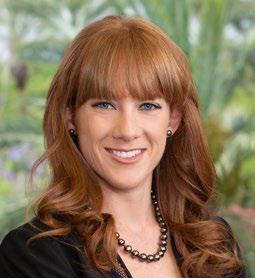
A CAREFUL DEFINITION OF WHAT YOU PROVIDE YOUR CUSTOMERS—HORSE AND HUMAN—CAN SET YOU APART FROM OTHER BARNS AND BE THE BACKBONE OF YOUR MARKETING EFFORTS.
BY JENNIFER PAULSONAs a horse trainer, you work in a service business. Your services range from training and maintaining show horses to providing care and feeding to them for your customers. It’s important that you ask yourself, “What do I offer that makes my customers’ lives better (horse or human)? How do I help them achieve their goals? What about my business gives me an edge over someone else or another hobby?”
From the answers to these questions, you’ll uncover many marketing messages and opportunities as well as your “value proposition” or your “unique selling proposition.” This single statement can streamline your entire marketing effort, making your life easier.
A few key mistakes can take you down the wrong road when identifying your value proposition. Avoid these so your effort is as effective as possible.

First, don’t go too inward. Focusing only on your viewpoint of your business is a recipe for failure. You have to connect your potential customers with what you provide for them.
Second, don’t find yourself in the weeds, digging into the nitty-gritty of your processes. Keep it simple so anyone can understand your message, especially a newcomer to your barn or to the sport.
Third, don’t forget to target your specific customer. Create an avatar of the horse owner who best fits in your barn, and do what it takes
to appeal to that person. For example, if you only want to focus on starting colts, all of your messaging, images, videos, etc. should focus on people who buy and sell young horses. Don’t waste time marketing to parents of youth riders.
It might seem easy to come up with what value you provide your customers, but you must take a deep dive into your business so your message is compelling and truly sets you apart. Think about no-fit or poor-fit customers, and remove them from your process. Fringe customers either offer no revenue or high effort that isn’t in line with the value they provide your business. Once you’ve done that, move to the perfect-fit customers (represented by the avatar you created) and those who are good, solid fits.
What do they want from their horse trainer? What challenges do they face that you can solve? What do you provide that they can’t get from another trainer? Stay focused on what the customer thinks is important—don’t make it about you. You have every right to be proud of your accomplishments, but if they don’t help your customer, then they don’t need to be part of your value proposition.
Your statement must be short and to the point. You’ll edit it down to the fewest words possible so it’s punchy and direct to your customer. Start with a statement that acknowledges your customer’s problem, then offer how you can solve it.
Many say it’s as simple as, “We help X do Y by doing Z.” Here are a few steps to get there.
Talk to your current customers to find out why they chose you over another pro. What have you helped them with the most? This valuable input can set you in the right direction. They might even
XYZ Colt Starting: Building a Solid Foundation for Your Horse
XYZ Colt Starting puts the right start on your young horse for a long, successful career as a performance horse.
123 Performance Horses: Teaching Sound, Safe Horsemanship
123 Performance Horses teaches riders of all levels safe riding and training techniques that last a lifetime.
ABC All Stars: Your Barn for Reaching the Stars
ABC All Stars gets you to the top and pushes you to your greatest potential as a reiner, rider, and person.
identify key factors that you don’t notice, which can be really helpful.
Keep your statement simple. This isn’t the place to note every aspect of your business; you can put all of that information on your website and direct potential customers to look there to learn more.
Once you’ve written it out, test it! If you have three versions, send them to your employees and current customers to see which best represents your business. Accept the feedback, and then retool your proposition to a perfect fit. Check back on the relevance of your value proposition often. It should change and evolve as your business grows and your customers’ needs change. n
Whether your kids are tiny tots or teens, balancing your job as a trainer and business owner with your family can be a tough row to hoe. Here are a few tips that might help you find more balance—or at least a sense of sanity—in the endeavor.
1. Hold family meetings. A weekly family gathering can ensure that everyone is on the same page for what’s happening that week, from doctor appointments to horse shows. During the meeting, make intentional checkins with each child to see how they’re doing and what they might be nervous or excited about in the week to come.
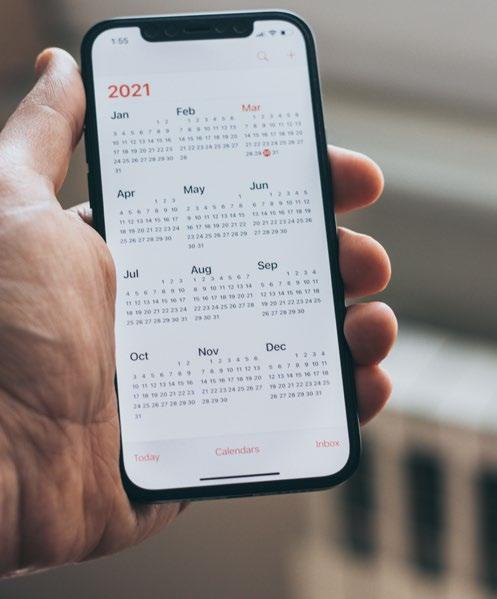
2. Make a family calendar. It might be best to go week-by-week for an ever-changing family calendar, but a bigger picture can be helpful in the grand scheme, too. Your calendar can take shape during your family meetings. There are many ways to build this tracker—it can be a group text with all events of the week, a paper calendar kept on the fridge or somewhere everyone will look, or an online calendar (your email provider probably offers one).
3. Work in blocks. Breaking your day into sections can make things seem less overwhelming and also make the most of your time. For example, tackle things that require your complete focus during the hours your kids are in school or day care. It might work to conduct computer work during your kids’ homework block. These blocks will help you set a schedule and put boundaries in place that help you manage your time and relationships.
4. Hire or trade help. Do you have a youth rider who you could trade an extra lesson for some
babysitting? Or a customer who has a daycare who would barter some child care for board? Just a few hours a week of extra help can free up larger blocks of time for you to be with your family or handle business matters.
5. Bring in family. During exceptionally busy times, it might help to fly your parents or in-laws in for some quality time with the grandkids. Or maybe flying the kids to the grandparents is a better idea for your situation. Either way, at least you’ll have peace of mind knowing your kids are enjoying time with loved ones when you’re spread as thinly as you can be.
6. Expect bumps. There will be days you’ll get less done—probably many of them. There will be things you miss or forget. There will be times when the TV takes over as a longtime babysitter. Expect these trips off track and cut yourself slack. You can’t give your kids or your business your best when you’re wallowing.
If your 2023 social media strategy includes adding Facebook advertisements to your toolbox, you need to check out the Advertiser Success Center. They call it “your all-in-one resource for leveling-up your advertising strategy,” and it’s free of charge.
Here you’ll find links to learn more about:
• How the ad auction works
• Choosing your objective
• Finding your perfect audience
• Setting your budget
• Creative tips for ad creation
• Measuring your performance as your ad runs and following your campaign
Once you’re a master of those aspects of Facebook advertising, you can continue your growth with their tips for video creation, testing strategies, and more.

You might ask yourself, why would you use Facebook ads? Here are just a few reasons.
• To advertise a clinic or educational opportunity
• When you relocate your business
• To draw new customers to your barn
• When you add services to your business
• To sell tack or gear to outside customers n
In February, during the annual NRHA Winter meeting, the Professionals Committee, along with other pros and members, convened to discuss opportunities, concerns, and the future of NRHA Professionals.
During the 75-minute gathering, NRHA Professionals Staff Liaison Patti Carter and Committee Chairman Jordan Larson led discussions that will shape the direction of the pros in the short- and long-term. When Carter asked about what the pros had on their minds to set a strategic plan in place, topics such as being more involved in policymaking, rules and education, and increasing communication came up. See the item “Stay Connected” on page 14 to learn how to join the many communicative outlets developed for NRHA Professionals. There are 800 NRHA Professionals, but only 100 of you have signed up for text alerts here! This is one of the easiest ways to stay on top of information directed at pros.
Discussions also included ways the pros can have a say in the NRHA Hall of Fame and how to facilitate a pipeline for aspiring professionals to connect with current trainers. Ideas to fill the need for assistant trainers and young pros include developing a web portal with information about how to become a pro, offering regional clinics for aspiring horse trainers, and connecting with affiliates and collegiate riding programs to promote opportunities.
Have ideas to share or thoughts on the topics covered at the meeting? Get in touch with Carter at pcarter@nrha .com, speak with Jordan Larson or any of the other committee members (found on page 2) when you see them at a show, and stay connected by using the opportunities found on page 12.
are
Are you connected with your NRHA Professionals peers and the association? Be sure you stay in touch with the following communication outlets so you don’t miss any news, discussions, requests for input, and opportunities to volunteer.

JOIN THE FACEBOOK GROUP. It’s super-easy to join. Get on Facebook, and search “NRHA Professionals” or click this link. Request to join the group, and Sara Honegger will approve your entry if you have a current Professional membership. This group can be a terrific resource for many things. Post when you’re looking to find shared lodging for help at a show, hiring new help, have questions for the group, and even to get access to the digital NRHA Pro Trainer each quarter.
JOIN THE TEXT LINE. Join the NRHA Professionals text line by clicking this link. Here you’ll get notifications of important meetings, information from the association, and receive a link to the digital NRHA Pro Trainer each quarter.
UPDATE YOUR PROFILE. Go to ReinerSuite™ and click on “Trainer Profile” to update your phone number, address, focus of your business, logo, accolades, and more to help new customers find you when they use the Find A Pro button to locate a professional. n
As you grow in your business, you might find yourself looking for educational opportunities that help you grow your business skills so you can increase profitability, raise returns on your marketing efforts, and more. There are numerous online resources for this type of continuing education, and one of those is stackskills.com StackSkills offers a variety of online learning opportunities at varying price levels and time commitments. You engage with the courses on your own time—the classes are on-demand and can be viewed on your computer or your phone. All you need is internet. The more than 4,000 courses can be purchased separately, or they offer more than 100 bundles of related course work. n
Things are really getting into motion as you approach late-spring and summer events. Are you ready to leverage them for your business?
Latch on. There are several high-profile events happening in the horse world in the coming months. Even if you won’t compete in them, explore ways that you can use their notoriety to promote and build your own business. Use of hashtags, attend events as a spectator and share your experience, or partner with other trainers and brands to reap big benefits.
Take a risk. The biggest rewards can come from taking risks. Risky doesn’t have to mean negligent; it can mean doing something you haven’t done before or have been scared to try. The first one that comes to mind is trying video—just do it.
Move forward. Did you have to abandon an idea earlier this year to tackle another issue? Pick it back up and move it forward.
Share more. Engaging an audience requires authenticity. Sharing your feelings and perceptions goes a long way in showing your true self to your audience, drawing them in and seeing why you and your business are different than others. n
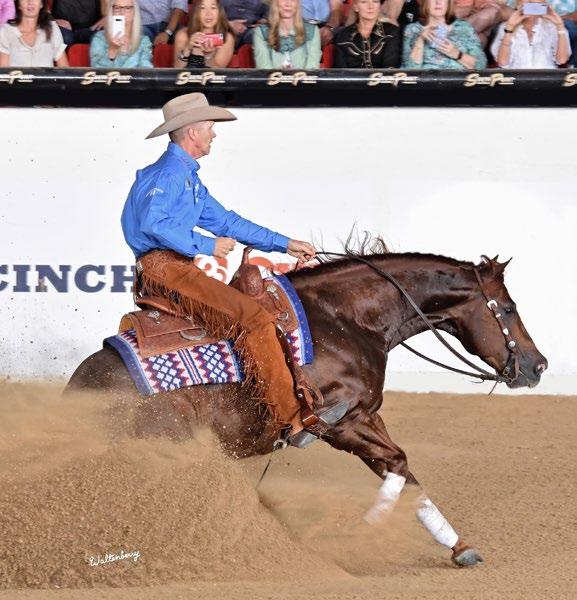
Being an NRHA Professional holds you to a high standard in your horsemanship, your showmanship, your customer relations, and your business management. Annually, NRHA recognizes various Professionals of the Year who exemplify excellence in all that they do, in and out of the arena. The pool of candidates comes from the general membership—NRHA Affiliates. The final selections are made by your peers—anyone with an NRHA Professional membership in good standing had the opportunity to vote online for who was most deserving of these distinctions. Then the NRHA Professionals Committee validates the selections before they’re shared with the world. Here are your 2023 NRHA Pros of the Year.
Name: Nathan Piper
Hometown: Whitesboro, Texas
NRHA Lifetime Earnings: $1,571,992
What It Means: “All I could think was how neat this is,” Piper says. “I didn’t expect to even be on the list, let alone win it. This is such an honor because I feel so blessed to be part of the reining industry. There are so many who’ve helped me
BY JENNIFER PAULSONget here. I appreciate that we all help each other out, so to be voted to receive this honor is a testament to the entire industry. The Good Lord has gotten me through so much to get here. It was tough for me in the beginning; I had no real horse background, so there were lots of hard times and mistakes. When I crossed one million in earnings, I had to reflect. The same with winning the Run for a Million. Wow, the Lord did all of that to get me to this point. Reflecting on it and recognizing how it all happened was so important. He pulled me through.”
Advice to Pros: “It’s a tough business,” he shares. “There are times it’s so hard. Lean on the Lord and don’t quit. You’ll go through hard times and question if you’re in the right place and ask yourself if you should be doing this. Every time I’ve felt down, I reach to the Lord and He led me where to go. Also, put the horse before the sport. Got calls on us to take care of these animals. Take your time; go at the horse’s pace. Every horse is an individual.” →
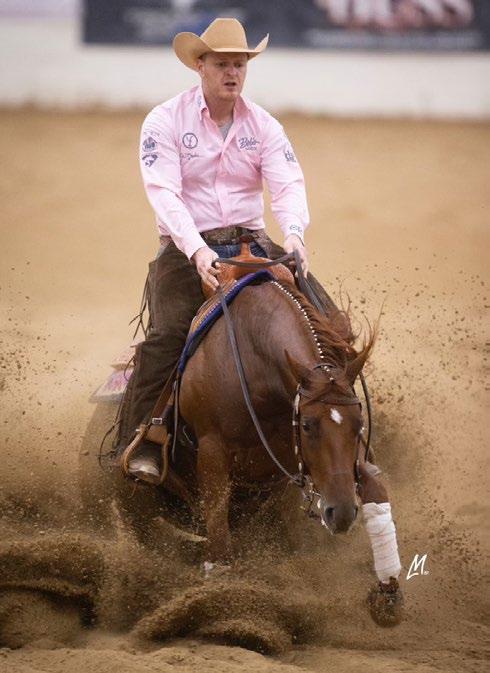
Name: Jordan McBurney
Hometown: Arlington, Washington
NRHA Lifetime Earnings: $375,055
What It Means: “I was pretty shocked,” McBurney relates. “It’s a big deal because I really appreciate the people who nominated me and my peers in reining who voted for me. You hope to achieve something like this, but you never know if it will happen. I strive to be someone who people look up to, non pros and youth riders. Being an NRHA Professional is a big deal—it comes with responsibility. My main goal is to produce happy reining horses that are also successful in the show pen that go on to be good non pro horses or breeding horses. Nice, happy horses that can do maneuvers at a high level are always my goal.”
Advice to Pros: “A lot of people will tell a young horsewoman that it’s a man’s world,” she cautions. “But it’s not that way. Find your process. Be organized. Work hard. Stick to your guns. Learn from everyone. It all pays off in the end.”
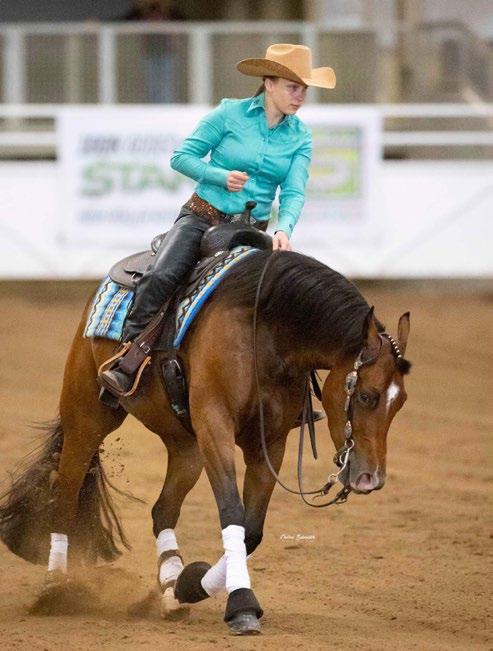
Name: Jack Daniels
Hometown: Aubrey, Texas
NRHA Lifetime Earnings: $79,005
What It Means: “I was so thankful my peers voted for me,” Daniels says. “I honestly didn’t think I’d get it—some of these guys have much more experience than I have. I started riding reiners after I broke my wrist and couldn’t rope. I watched a reining clinic [by a local trainer] and called after to see if I could come learn from him and work for free. He thought I looked pretty good. I moved to the States in 2016 and worked for Craig Schmersal. I met my wife in 2018 (Kaci O’Rourke). She really challenged me to start showing. Otherwise I’d have just kept with the 2-year-olds. I’m a competitive person, so I enjoy the process of showing and improving. Wanting to get better is what keeps me going.”
Advice to Pros: “It doesn’t matter what anyone else says; don’t listen,” he advises. “People thought I should just stick to 2-year-olds. If you really want to do it, do it. Soak up all the knowledge you can. Ask a lot of questions, even if you think you know the answer. A lot of times, you’ll learn something you didn’t expect.”
Name: Dan Huss
Hometown: Scottsdale, Arizona
NRHA Lifetime Earnings: $740,761
What It Means: “It’s a big honor to be recognized,” Huss shares. “It just makes you feel good to be nominated and then voted for by people you usually compete with. It’s a great show of appreciation for my time and effort. I’m fortunate to have been in a teaching environment for many years, as a teacher at University of Findlay for 19 years. I had to teach all different levels of riders there with all different backgrounds. My main goal with my non pros it to teach them to do their job really well by giving the horse a correct, positive signal. If you do that on every maneuver, the outcome takes care of itself.”
Advice to Pros: “Patience and customer service are very important with our non pros,” he says. “Make it an enjoyable environment for your non pros to come and learn. I try to make it as easy as possible for them. Our youth riders do all the work, but we take care of everything for our non pros. They come and ride, and we do the rest. To be a successful non pro coach, you also need to be able to break down every maneuver into steps that are easily understood by your customer. Once they accomplish step 1, they start to build confidence with each next step. Finally, I like to tell my customers it’s never about memorization. It’s about visualization. Visualize that perfect pattern for that horse, including the signals.”
Name: Shane Kelly
Hometown: Lampasas, Texas
NRHA Lifetime Earnings: $58,469
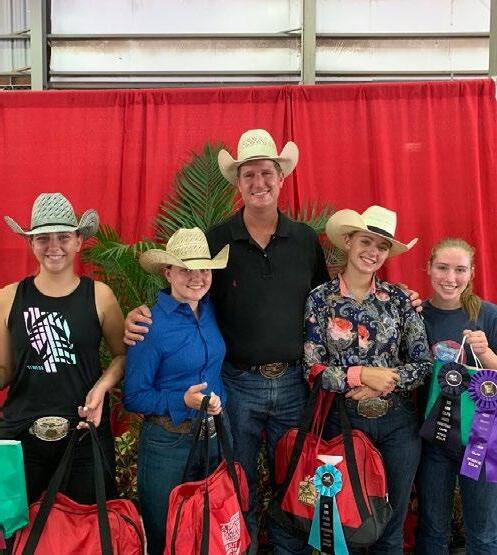
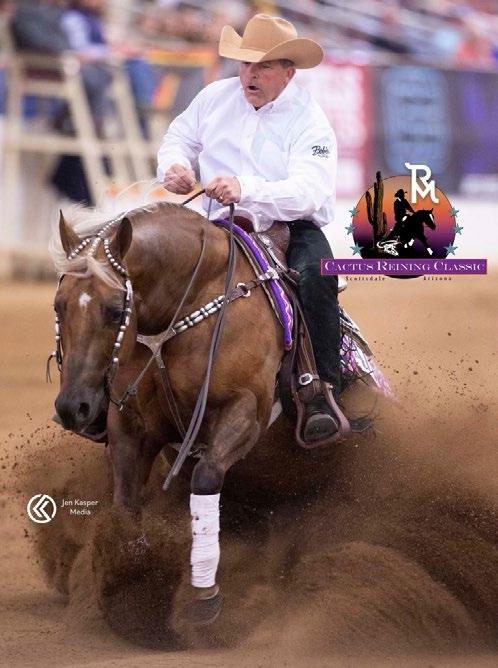
What It Means: “I was very excited to receive the award,” Kelly shares. “I’ve been nominated before, and it was exciting to get the award this year. Adding youth riders to my program was a natural fit. I started with a few, and then it grew to more. I enjoy challenging the kids and seeing what they can do. Most of them take to it very well. Teaching them life skills with horses is so rewarding. It’s great to see how they conduct themselves and become young adults. Winning prizes is icing on the cake.”
Advice to Pros: “Let the kids do the work—they want to do it themselves,” he advises. “Give them opportunities to make mistakes and learn. That’s how they get the most out of riding horses and find the most confidence.” n
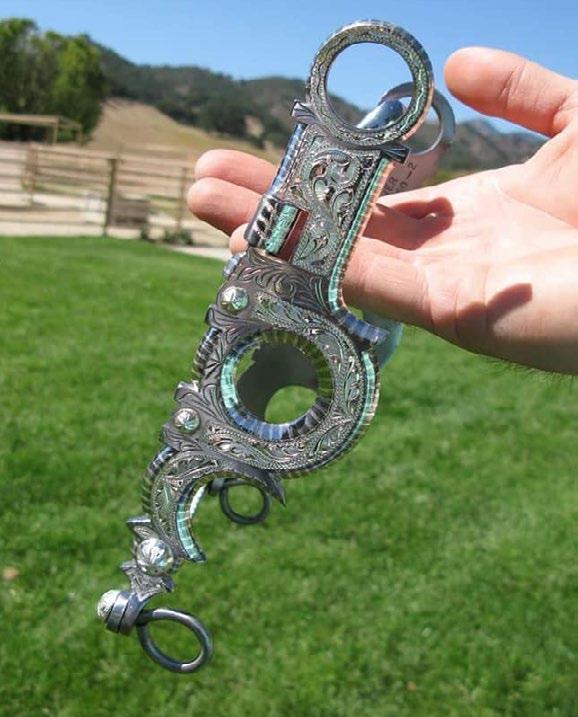
PROFESSIONALS ARE USING THEIR EXPERTISE TO IMPROVE UPON THE PRODUCTS THEY USE EVERY DAY—AND CAN MAKE SOME EXTRA CASH FROM THEIR FORWARD-THINKING.
BY MEGAN ARSZMANYou spend a lot of time in the saddle and in the barn, from wrapping legs to washing tails to packing trailers and cleaning stalls. You also spend a lot of time around horses. You know your animals inside and out, know the saddle they ride in from horn to cantle, and they know their equipment from Chicago screw to latigo.
This puts you in a unique situation to know when something needs to be improved.
Too bad someone can’t just read your mind and develop a better product to help you succeed and achieve a goal.
Why can’t that person be you?
That’s what other professionals have done— taking their experience in the saddle and their time in the barn and learned how to conceive an idea and make it a reality. And that reality has been another way for them to not only support their family outside the arena, but to solidify their place in the horse industry.
Enter the world of product development.
We tend to think of inventors as such as Benjamin Franklin or Elon Musk. Neither would look comfortable in a saddle. But that doesn’t mean that someone who spends their
days in the saddle can’t be an inventor.
“We get all these great ideas, but you have this day job where you have to ride horses all day,” says NRHA Million Dollar Rider Matt Mills. “It’s hard to get those ideas off the ground and get things going.”
That was the case for Mills. The Weatherford, Texas, trainer admits that he’s wired a little differently. He likes to figure out how things work—whether it’s a horse or a sport boot. He’s had ideas tumbling around in his head for years, just waiting for a good time to come to fruition.
For National Reined Cow Horse Association Hall of Fame trainer Les Vogt, he realized that because he was spending all this time trying to help a horse move his body, he knew bits and he knew what needed to be changed to help the horse.
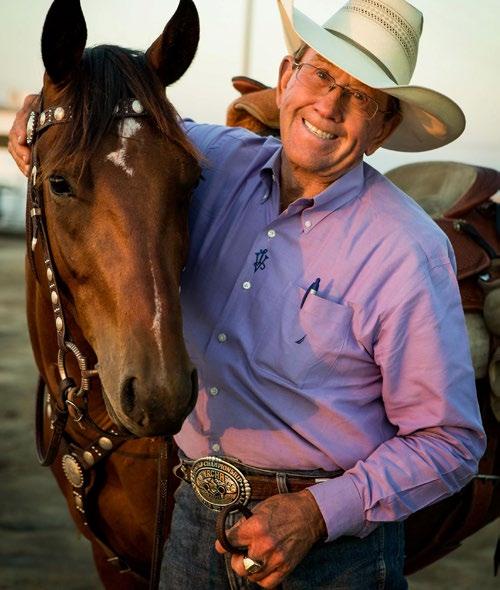
“My experience came from the past 65 years of training horses, and I came to a lot of conclusions as to what might work better,” he says. “So how did I pick bits? Trainers have a lot of bits hanging somewhere, and we always change bits and kind of guess compared to our experience. I thought about what are some things that we want to fix on horses.”
The idea for a product—whether new or
improved—can come from anywhere. It’s just a matter of making that thought bubble turn into black and white on paper, then turn that two-dimensional design into something you can actually hold and put on your horse. And for that, it takes time.
Navigating Development Mills realized that it was more important that he continued to focus on training horses, because that was his main source of income. He understood that there were parts of the product development world he didn’t understand, nor did he have the time to understand it all. He put his trust in a development partner.
“I chose the route of finding a strategic partner who was already in the business of product development and already had a path for manufacturing and retail,” Mills says. “But he didn’t know anything about horses, and that was the easy part for me.”
That partner is Tedd Johnson of J5 Brands, Inc. Johnson asked Mills if there were two items he could redesign and improve to help his horses or his job as a trainer be better, and Mills had insight for a new type of sport boot and noturn bell boot.
Working with Johnson, multiple versions of boots were worked with, each pair coming with a set of notes from Mills on what needed to change and what should stay. Once there was a model that Mills was happy with, the action really started. From conception to production, the total timeline was less than two years.
“It’s a lot of work, but for me the only way it was going to work was to have that partner,” he says.
Vogt’s approach was more immersive than Mills, mostly because of the timing in his career (which we’ll get to later). Vogt started working with silver to design and create his own line
of bits and spurs. In an age where there was no Internet, he went door-to-door attending tradeshows for manufacturing companies and dealers. There, he met someone who had access to commercial sewing machines, which was perfect since he happened to hold the patent for the first wrap-around split boot for horses.
“It took five years from when I started working with the boot to the time of the first purnchase,” Mills recalls.
Vogt did his own marketing by mailing press releases with information for makeshift advertisements. “Probably 20% of my press releases were printed.”
Vogt then sold his boot patent to a major equine brand, working with them to design more products before going back on his own to design and create bits. He’s watched his initial sport boot design morph from his patent to designs that feature patterns, bright colors, multiple hook-and-loop closures, and more technical materials.
While Vogt invested a lot of time and money in his patent years ago, he says it wasn’t worth the effort. It’s the same reason why Mills didn’t pursue a patent for his sport boots.
“You can’t enforce the patent,” Vogt says. “There are companies that are much bigger, with more money, that can figure out how to get around your patent—they just have to change one little thing. But I look at it like this: If they’re doing something better than I did, they’re just improving on my product. They’ve bettered the market.”
Both men learned a lot when it comes to the business world. Now, Vogt works with Equibrand Group, which owns Classic Equine, Martin Saddlery, and more, but sells most of his product online. Mills is working with J5 to build the Equine division and hopes to release more products as the year goes on.
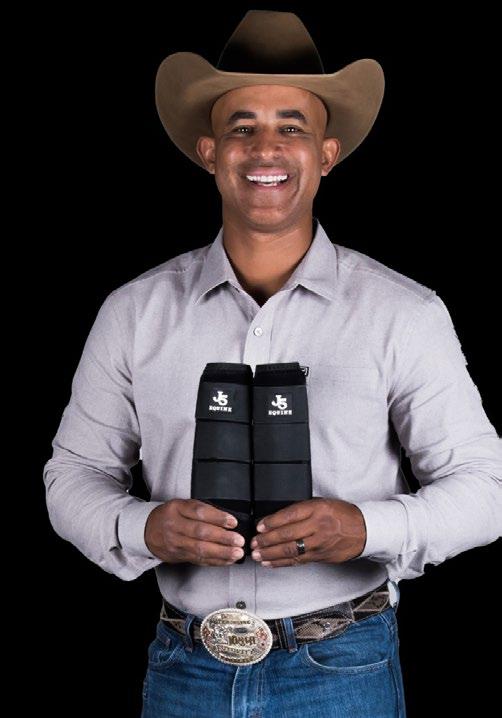
It’s preached that professionals should have a secondary income for when that day comes that eight hours spent in the saddle is no longer feasible. That’s why both Vogt and Mills made strides for their products.
“I knew I had to do something—I didn’t want to be a trainer who died with nothing,” Vogt says, who’s 80. “I wanted to retire while I was still at the top. I was still winning, but I wanted to be just as good as the memories. I show every once in a while, but I mostly rope now.”
“I don’t want to wait until the end to get some of this stuff started,” Mills concurs. “I want to take advantage—we’re in a great time right now, and it’s a great time to explore.”
Both professionals capitalized on their strongest assets—Vogt’s ability to educate and Mills’ media spotlight. Mills debuted his boots
to his social media followers as a test to see how successful the boots could be.
“It’s really easy for me to sell something that I believe in, because I designed it,” he says.
Online sales started strong. Now you can find the product line offered by esteemed tack stores and featured on television.
“I decided what was my most valuable asset, and for me, that’s my name,” Vogt shares. “And I didn’t just want to put my name on 5-gallon
Sure, you’ve got a great idea for the next best piece of tack, but you’re locked into a sponsorship with a saddle company and you don’t want to upset anyone. What do you do?

Matt Mills was an endorsee of another equine product company, which is known for their own lines of sport boots, saddle pads, and other tack essentials. So, to now see him creating and endorsing his own line, some could wonder about contract issues somewhere. Mills waited until his contract with his sponsors had run out before looking to develop some of the ideas he had brewing for years, keeping everything professional.
“I wasn’t in breach of my contract at all with the way things were timed (with the development of my sport boots),” Mills says. “I still use their products, and they’re a great company. They’re way farther down the road than we are.”
Sponsors can work to your advantage, too. Gauge your relationship with your partners, and see if they’d be open to developing your idea with you or tweaking a current model with your twist to improve it. Work with your sponsors to develop your role and compensation for your ideas and input.
“I don’t want to wait until the end [of my career] to get some of this stuff started,” shares Matt Mills. “I want to take advantage—we’re in a great time right now, and it’s a great time to explore.”
buckets. I knew I needed to find a way to use my name to create a bigger and better image that people will want to buy.”
Entering the world of entrepreneurialism isn’t as easy as swinging into the saddle. It’s going to take time and thick skin to launch a successful product.
“This is not for everybody, but the point is it can be done,” Mills concludes. “It’s a lot of work, I’m not going to lie. But I’ve been able to balance it all out. It’s a lot of fun; I enjoy this.” n
Most professionals dread tax season, but your taxes should be on your mind all year long. Not only is there the need for extensive record keeping, but you also might question if something is a legit tax write-off or if you’ll get in trouble with it.
A tax write-off, or tax deduction, is a legitimate expense that lowers your taxable income on your tax return. And while you might think something is a tax deduction, it’s the IRS that ultimately determines which expenses can be considered legitimate or not. It must be connected to your business as an expense directly related to conducting your business.
When you file your tax return, the IRS will use your reported income, minus the tax deductions and credits to determine which tax bracket you should be in, which determines the tax rate your taxable income will be taxed. In short, the more deductions you have, the lower your reported income, thus the lower your taxable income and tax rate.
So, what can horse trainers write off for tax purposes? Bookkeeper and horsewoman
Kristina Vaughn shares these tax tips for NRHA Professionals. Here are seven cut-and-dried answers to common write-off questions.
1. Do you buy/rent your own practice cattle for training cutting or working cowhorses? This is a deductible expense as long as you are sure to keep careful records for how they are being used and report the income from selling the old herd when you buy “fresh” cattle.
2. Do you use your dog for security at the barn, which you own? Check with your tax
professional to see if Fido’s vet bills can be considered tax-deductible.
3. Is your business logo stitched on any gear (yours or someone else’s)? The show gear with your branding can be written off as marketing materials.
4. Do you train your own horses to sell? The costs for developing the value of those horses and entering them in shows are fully deductible (care, show fees, stall rental, feed, grooming, vet, farrier, hotel, meals, tack and gear, etc.).
5. Do you attend seminars and/or certification programs to enhance your education? As long as it pertains to bettering your business, these can be written off.
6. What about the occasional dinner with clients while talking business? As long as the costs are reasonable and not extravagant, keep pristine records on with whom you dined, where you went, and the reasons for the dinner.
7. Do you do your own bookkeeping and charge clients via third party software (such as PayPal, Venmo, Stripe, Square, Zelle, etc.)? The payment processing fees are sure to add up as deductible expenses. These can be claimed.
In the training business, the lines often get blurred between personal expenses and business expenses. Which items are commonly written off that should not be written off for tax purposes— and can get you in trouble with the IRS? A couple of the top items that the IRS will target in the case of an audit include the following.
1. Any dog/cat food and toys. Do not pay for your pet expenses from your business account and write it off. Purchasing these items while purchasing horse feed, supplements, and bedding?
2. Do a separate transaction. Do not pay for your personal expenses (or anything else not business-related) from your business account and think you’re pulling one over on the tax man. They’ll eventually get you.
3. If your business is to train and sell horses for owners, note that your own personal horses and related expenses (boarding, feed, tack, show boarding, show entries, etc.) are not deductible and are not related to the income producing activities of your business.
4. If you have workers who are not legal to work within the United States, writing this labor expense off on your taxes can be risky business and can potentially bring hefty fines from various authorities.
No. 2 above might seem confusing, because No. 4 in the first part of the article conflicts with it. The distinction is that if you’re competing on a horse owned by you that’s meant for resale in the future, then the costs for this horse are deductible. If the personal show horse is not meant to be sold in the future, there are a few questions that need to be asked to determine if expenses incurred for the horse are deductible:
- Is there prize money to be earned in the competition and reported as income?
- Does the income from prize money earned justify the costs incurred to keep and train the horse?
- Can the argument be made that you use various competition performances on your own animal to establish your name/business in the industry (this could be answered by determining the previous question)?
If the answer is yes to the questions above, then
the costs of your own horse can be deductible. If the answer is no to the above questions, then expenses associated with your personal horse should not be claimed. As always, seek the advice of a tax professional when working through these situations.
This rule, in terms for breeding, training, and showing horses, your business needs to have a profit in two or more of the taxable years in a period of seven consecutive tax years. If you’re keeping this rule in mind, do not include unrelated income on your tax return just to offset your equine business losses. In the case of an audit, this will be examined.
Record any large purchases in your books as assets, and then depreciate them to spread your tax savings over several years. Don’t take these to be expensed, warns Vaughn. The typical safe harbor for fixed assets is $2,500. This includes vehicles, trailers, horses, fencing, round pens, mowers, etc. You’d be surprised how many people either do this incorrectly or just forget to consider these at all.
“As with any and all financial transactions related to your business, keep your receipts and documentation for proof,” stresses Vaughn. n
Kristina Vaughn is the owner of Legit Ledgers, LLC, a bookkeeping business that serves only equine professionals, catering to the needs of horse businesses nationwide. To learn more about Vaughn’s business and how she helps horse professionals keep their books straight, visit legitledgersllc.com.

We, the members of the National Reining Horse Association Professionals, in carrying out our role of providing service to the reining horse industry, recognize the need to do so in a professional manner, and to represent the sport of reining in a professional manner with the highest degree of integrity.
Therefore, we have set forth the following code of ethics, which shall govern our endeavors in the industry. By signing this application, I agree to be bound by the rules of the NRHA Professional Code of Ethics. To participate in this program, I concede to maintaining a continuous individual membership with NRHA.
As a member of the NRHA Professionals, I will:
• Adhere to the professional standards of the NRHA and work to further its goals and objectives.
• Ensure that the welfare of the reining horse is paramount and that every horse shall always be treated humanely and with dignity, respect, and compassion, regardless if the horse does not reside under my direct supervision.
• Positively influence all members to refrain from any perceived misconduct or inappropriate actions towards either horses or other members.
• Conduct my affairs in the sport of reining with integrity, sincerity, and accuracy in an honest, transparent, and forthright manner.
• Act with integrity in my dealings with reining clients, other NRHA members, and the public when representing the sport of reining. In this regard, any horse shown by my spouse, client, or child will be economically owned as prescribed by applicable NRHA rules.
• Handle my reining horse business, operations, and communications (including those through social media) in a manner, which promotes a positive image of the reining horse industry.
• To fully disclose to customers the actual sales price and commissions involved in the sale or purchase of a horse.
• To not charge or receive a monetary commission, or other remuneration constituting a commission, from both buyer and seller of a horse.
• Model the proper ideals of positive sportsmanship and fair competition, and show cordial courtesy to fellow competitors, members, and Judges.
The Professional Code of Ethics is intended as a general guideline for reining professionals’ behavior and is not intended to be an exhaustive list of conduct for NRHA Professionals. NRHA Professionals’ conduct is also governed by NRHA Rules. This Code is intended, however, to state basic standards, which should govern the conduct of all professionals and to provide guidance to assist professionals in establishing and maintaining high standards of conduct within the reining horse industry.
This Code of Ethics generally identifies the ethical obligations of NRHA Professionals and does not substitute for, nor is it intended to substitute for, or in any way alter or modify the NRHA rules.
The members of the NRHA Professionals Committee created the NRHA Professional Code of Ethics to further promote the humane treatment of reining horses and ethical business practices. If you have questions regarding this code, please reach out to Sara Honegger at shonegger@nrha.com